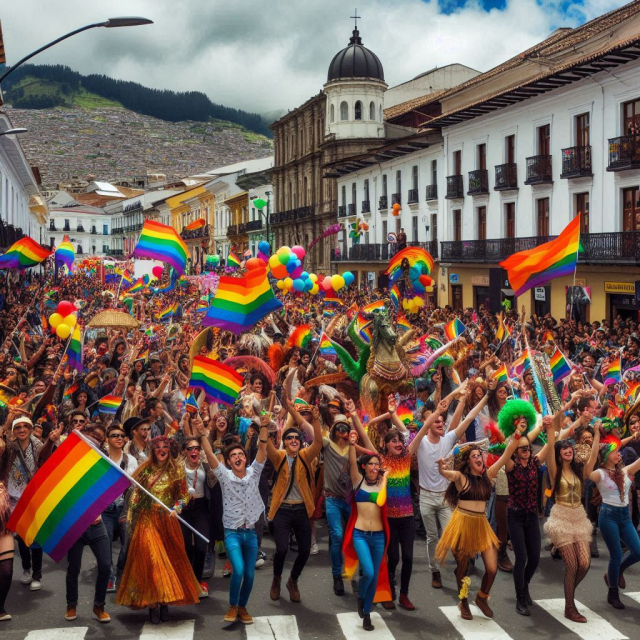LGBT Pride Day is celebrated globally on June 28 in commemoration of the Stonewall riots of 1969, which marked the beginning of the modern LGBT rights movement. In Ecuador, this date is an opportunity to make sexual diversity visible, claim rights and celebrate identity and love in all its forms. This article explores how LGBT Pride Day is experienced in Ecuador, highlighting its history, the activities carried out and the challenges faced by the community.
History of the LGBT Movement in Ecuador.
First Steps towards Equality.
The LGBT movement in Ecuador has come a long way. In 1997, homosexuality was decriminalized in the country, an important milestone that marked the beginning of broader recognition of LGBT rights. However, the fight for equality and acceptance has continued, with significant progress over the past two decades.
Recognition of Rights.
In 2008, Ecuador's new Constitution included important advances for the LGBT community, such as the prohibition of discrimination based on sexual orientation and gender identity. In 2019, Ecuador's Constitutional Court legalized same-sex marriage, another crucial step toward equality.
LGBT Pride Day celebrations in Ecuador.
Marches and Parades.
One of the most visible manifestations of LGBT Pride Day in Ecuador are the marches and parades that take place in several cities in the country. Quito and Guayaquil, being the largest cities, organize massive events that attract thousands of people from all over the country.
Quito.
In Quito, the LGBT Pride march runs through the main streets of the city, ending in a large concentration where concerts, speeches and cultural activities are held. This event not only celebrates diversity, but also serves as a platform to make the community's demands visible and demand respect for their rights.
Guayaquil.
In Guayaquil, the Pride march is also a massive event that brings together the LGBT community and its allies. The city is filled with colors, music and joy, creating a festive atmosphere that highlights diversity and inclusion. As in Quito, the march culminates in an event where cultural and artistic activities are carried out.
Cultural and Educational Activities.
In addition to the marches, LGBT Pride Day in Ecuador includes a variety of cultural and educational activities. Art exhibitions, film screenings, workshops and talks are organized that address issues related to sexual and gender diversity.
Exhibitions and Art.
Art plays a fundamental role in LGBT Pride celebrations. Art exhibitions, including photography, painting and performance, offer a platform for LGBT artists to express their experiences and perspectives. These events not only celebrate creativity, but also promote reflection and dialogue on diversity and equality.
Workshops and Talks.
Workshops and talks are an important part of LGBT Pride celebrations. These events address topics such as human rights, sexual health, inclusive education and the fight against discrimination. Workshops also offer a safe space for LGBT people to share their experiences and find support.
Challenges and Achievements of the LGBT Community in Ecuador.
Advances in Rights.
Despite legal advances, the LGBT community in Ecuador still faces significant challenges. Discrimination and violence are persistent problems that affect many LGBT people in the country. However, the legalization of same-sex marriage and the recognition of trans rights are important achievements that demonstrate progress towards equality.
Fight against Discrimination.
The fight against discrimination continues to be a priority for the LGBT community in Ecuador. At the institutional level, policies and programs have been implemented to promote equality and combat discrimination in different areas, such as education and employment. However, changing social attitudes and perceptions remains a challenge.
Visibility and Representation.
Visibility and representation are key aspects of the fight for LGBT rights. In the media, the presence of LGBT characters and narratives has increased, although there is still much to do. Positive and accurate representation in television, film and other media is crucial to changing perceptions and fostering acceptance.
Health & Wellness.
Access to adequate health services sensitive to the needs of the LGBT community is another important challenge. Health care, including mental health, must be inclusive and respectful of diverse sexual identities and orientations. Specific programs and awareness campaigns are necessary to ensure that all people receive the care they need.
The Future of LGBT Pride in Ecuador.
Education and Awareness.
Education and awareness are essential to move towards a more inclusive society. Schools and universities play a crucial role in promoting diversity and equality. Educational programs that include topics of sexual orientation and gender identity can help reduce discrimination and encourage acceptance from an early age.
Alliances and Solidarity.
Solidarity and alliances with other social movements are essential to strengthen the fight for LGBT rights. Collaboration with human rights organizations, feminist organizations, and other social causes can amplify the voices of the LGBT community and promote broader change in society.
Activism and Political Participation.
Activism and political participation are powerful tools to achieve change. The LGBT community in Ecuador has proven to be resilient and determined in its fight for equality. Continuing to advocate for inclusive policies and actively participate in the political process is crucial to ensuring that the rights of all people are respected and protected.
LGBT Pride Day in Ecuador is a vibrant and meaningful celebration that highlights diversity and the fight for equality. Through marches, cultural and educational activities, the LGBT community makes its demands visible and celebrates its achievements. Although there are still challenges to face, advances in rights and increasing visibility are signs of continued progress. Education, solidarity and activism are fundamental to building a more just and inclusive society, where all people can live with dignity and respect.
